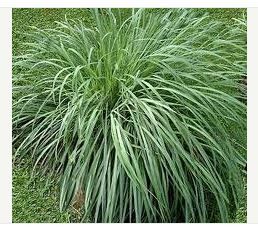Is Citronella Grass Your Best Bet For A Natural Mosquito Repellent This Summer?

A common sight on backyard decks everywhere, citronella candles, with their clean, fresh fragrance, are said to repel mosquitoes. The oil found in these candles is derived from Citronella Grass (Cymbopogon nardus), a plant native to southeast Asia and grown commercially in Sri Lanka, India, Burma, Indonesia and Java. Naturalized in tropical Asia, the plant is also grown as an ornamental in south Florida and southern California. Citronella is a perennial 'clumping' grass which grows to a height of five to six feet. It can be grown directly in the ground in any climate where frost does not occur and it flourishes when receiving direct sunlight. In northern climate zones, people often grow citronella in a large pots that they bring indoors for winter.
Inexpensive soaps sold in Asian markets are scented with citronella oil, which is often used as one of the 'essential oils' in aroma therapy. Practitioners claim it is a stimulant when inhaled or rubbed on the skin, and an antiseptic that can also be used to sterilize food preparation surfaces. Used as an ingredient for many meals, Indonesians often plant it at the corner of their house so that they can easily reach it when cooking.
Although some reports suggest citronella grass repels cats, the most popular belief is that it is a natural mosquito repellent.
Citronelle Grass and Mosquitos: Fact or Fiction?
Despite the heartfelt claims, citronella grass does not repel mosquitoes. No, it is the compound found within the plant — the oil — that does the repelling. In and of themselves, the plants are unable to release enough oil into the air to repel insects. Even the candles made with citronella oil do not; studies have shown that to keep mosquitoes away, the number of candles needed would create so much smoke as to be nearly intolerable. So, standing near living citronella grass plants, no matter how many, will never ward off the insects.
When the leaves are crushed, though, citronella grass will release significant amounts of their repellent oils which can be applied to the skin. This will work very well at repelling insects. In some cases, drying or infusing the plant into an oil or alcohol base would also be effective when applied to skin, clothing, or living spaces. Rubbing the crushed leaves directly on the skin is probably the most effective way to use the sweet-smelling natural repellent. It is recommended, though, that you test a small amount repeatedly on your inner forearm for a day or so; if there's no irritating reaction or redness, it's likely safe.
Significantly, studies have proven it to be highly effective.
Studies on Citronella and Other Oils
Researchers in Thailand investigated the repellency of volatile oils derived from four plant species against mosquitoes using human bait methods and compared these results against the use of DEET. The most effective commercial mosquito repellent formulations available today contain DEET (N,N-diethyl-3- methylbenzamide), a chemical formulation developed during World War II by the U.S. Army; unfortunately, some people have an allergic reaction to such products. In the study of oils, the usefulness of the additive vanillin to increase protection times was also investigated. Approximately 0.1 ml of test repellent was applied to the forearm of each volunteer while the other forearm was treated with the same repellent with 5 percent vanillin added.
The researchers concluded that citronella oil plus vanillin demonstrated a repellency equivalent to the standard repellents, DEET and DEET plus vanillin, with at least six hours complete protection against the yellow fever mosquito.
In short, do not be deterred from growing citronella grass and using the oil as a natural insect repellent!
Growing Tips for Citronella Grass
Like most grasses, citronella plants are low maintenance and do best in well-drained locations. Nitrogen-rich fertilizers will aid growth, but a treatment need only be applied once a year, preferably in early spring. When purchasing citronella, it is important to find true varieties, Cybopogon nardus or Citronella winterianus. Other plants are often sold as 'citronella scented', yet they lack the mosquito repelling qualities of true citronella. Many gardening centers sell citronella as small plants in pots, ready to transplant to your garden bed. In early spring, a new plant can be propagated by splitting large clumps into smaller sections and replanting them in pots or other areas of the garden.
Source: Tawatsin A, Wratten SD, Scott RR, Thavara U, Techadamrongsin Y. Repellency of Volatile Oils from Plants against Three Mosquito Vectors. Journal of Vector Ecology. 2001.



























